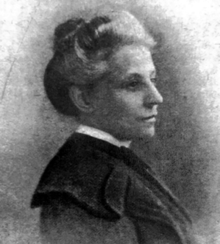Grace Frankland
| Grace Frankland | |
|---|---|
 | |
| Born |
Grace Coleridge Toynbee 4 December 1858 Wimbledon |
| Died |
5 October 1946 (aged 87) Loch Awe, Argyll |
| Nationality | English |
| Other names | Mrs Percy Frankland |
| Known for | Bacteriology |
Grace Coleridge Frankland known as Mrs Percy Frankland née Grace Toynbee (4 December 1858 – 5 October 1946)[1] was an English microbiologist. She was one of the nineteen female scientists who wrote the 1904 petition to the Chemical Society to request that they should create some female fellows of the society.
Life
She was the daughter (and youngest of nine children) of Harriet and Joseph Toynbee, a noted otologist. She was home schooled and spent one year at Bedford College[2], She married Percy Frankland in 1882, and with him developed an interest in the emerging science of bacteriology. She worked with both Percy and his father Edward Frankland and was described at the time as having "worthily aided and seconded [Percy]".[3] She co-authored papers with her husband on bacteria and other microorganisms found in the air[4] and water.[5] Colleagues of her husband noted that although their situation as husband and wife working equally together was not unique, he was 'the first man who had the chilvalry to admit it.'[6]
In 1903 she wrote a popular science book entitled Bacteria in Daily Life. It was written in an open style to engage a wide audience[7] and included important bacterial information pertaining to food, drink, smoking, pollution, sewage, air and disease. The book was reviewed in Nature in 1903
"an interesting, instructive, and accurate account of the modern developments of bacteriology. Such subjects as sewage disposal, the prevention of tuberculosis, micro-organisms in milk, air, and foods, which are of public importance, are fully dealt with. ......No one nowadays laying claim to a liberal education can dispense with a slight knowledge, at least, of microbes and their actions, and for such this work will prove an adequate text-book."[8]
She was a Fellow of the Royal Microscopical Society, admitted into the Linnean Society of London, and an honorary member of Bedford College.[9] Her application in 1904 to the Chemical Society was important.[1] She was one of the nineteen signatories of the 1904 petition to the Chemical Society. These prominent female chemists set out the reasons why they should be afforded the status of Fellow.[10] The petition eventually led to the admission of women as Fellows of the Society[11] (one of the Societies that amalgamated to become the Royal Society of Chemistry).[10][12]
Percy held positions as professor of Chemistry Birmingham, and Dundee universities. They lived in Dundee before retiring to Argyll[13]. As a result of their time in Dundee Grace is commemorated as part of Dundee Women's Trail.[14]
Grace Frankland's papers are part of the Frankland family papers, held by the University of Manchester Library.[15]
References
- 1 2 "Grace Frankland". ODNB.
- ↑ F., Rayner-Canham, Marelene (2008). Chemistry was their life : pioneering British women chemists, 1880-1949. Rayner-Canham, Geoffrey. London: Imperial College Press. ISBN 186094986X. OCLC 665046168.
- ↑ Quoted in Rayner-Canham; Marelene F. Rayner-Canham; Geoffrey Rayner-Canham (2008). Chemistry was their life: Pioneer British women chemists, 1880-1949. London: Imperial College Press. p. 424. ISBN 978-1-86094-986-9.
- ↑ "Studies on new Micro-organisms obtained from air".
- ↑ Frankland, Percy; Frankland, Grace Coleridge Toynbee. "Micro-organisms in water: their significance, identification and removal, together with an account of the bacteriological methods employed in their investigation, specially designed for the use of those connected with the sanitary aspects of water-supply." Longmans, Green, 1894.
- ↑ 1935-, Creese, Mary R. S., (1998). Ladies in the laboratory? : American and British women in science, 1800-1900 : a survey of their contributions to research. Creese, Thomas M. Lanham, Md.: Scarecrow Press. ISBN 0810832879. OCLC 36386419.
- ↑ "Reviews" (PDF). British Medical Journal. 1 (2207): 918-919. April 18, 1903. PMC 2513022.
- ↑ Hewlett, R. T. (1903). "Bacteria in Daily Life : Abstract : Nature". Nature. 67: 583. doi:10.1038/067583b0. Retrieved 2017-07-28.
- ↑ "Bacteria in daily life".
- 1 2 Rayner-Canham, Marelene; Rayner-Canham, Geoff. "Pounding on the Doors: The Fight For Acceptance of British Women Chemists". Bull. Hist. Chem. 28 (2): 110–119.
- ↑ Mason, Joan (1991). "A forty years' war". Chemistry in Britain: 233–238.
- ↑ Creese, Mary R. S. (5 January 2009). "British women of the nineteenth and early twentieth centuries who contributed to research in the chemical sciences". The British Journal for the History of Science. 24 (03): 275. doi:10.1017/S0007087400027370.
- ↑ Ewan, Elizabeth L.; Innes, Sue; Reynolds, Sian; Pipes, Rose (2006-03-08). The Biographical Dictionary of Scottish Women. Edinburgh University Press. ISBN 9780748626601.
- ↑ "Frankland, Grace née Toynbee – Chemist, Activist | Dundee Women's Trail". www.dundeewomenstrail.org.uk. Retrieved 2017-07-28.
- ↑ "Frankland, Sir Edward, Papers (The University of Manchester Library)". www.library.manchester.ac.uk. Retrieved 2017-06-12.
External links
- Works by Mrs. Percy Frankland at Project Gutenberg
- Works by or about Grace Frankland at Internet Archive
- Works by Grace Frankland at LibriVox (public domain audiobooks)
